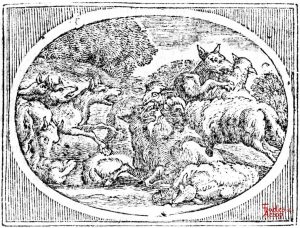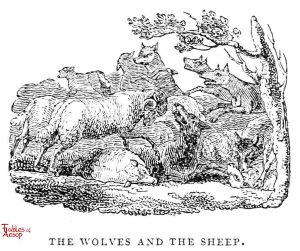Wolves and Sheep made a pact of peace where Sheep gave up Dogs and Wolves their young. The young cries and Wolves cried foul. Bye-bye Sheep!
Weaken your defenses at your own peril.
[See also the similar fable The Wolves and The Sheep.]

JBR Collection
The Wolves and the Sheep once made a treaty of peace. The Sheep were to give up their Dogs, and the Wolves their young ones, as hostages or security for its due observance. The young Wolves cried for their dams, and the Wolves thereupon alleged that the peace had been broken, and set upon the Sheep, who, deprived of their defenders the Dogs, could make no resistance.

Samuel Croxall
THE Wolves and the Sheep had been a long time in a state of war together. At last a cessation of arms was proposed, in order to a treaty of peace, and hostages were to be delivered on both sides for security. The Wolves proposed that the Sheep should give up their Dogs, on the one side, and that they would Deliver up their young ones on the other. This proposal was agreed to; but no sooner executed, than the young Wolves began to howl for want of their dams. The old ones took this opportunity to cry out, the treaty was broke; and so falling upon the sheep, who were destitute of their faithful guardians, the dogs, they worried and devoured them without control.
THE APPLICATION
In all our transactions with mankind, even in the most private and low life, we should have a special regard how, and with whom we trust ourselves. Men, in this respect, ought to look upon each other as wolves, and to keep themselves under a secure guard, and in a continual posture of defence. Particularly upon any treaties of importance, the securities on both sides should be strictly considered; and each should act with so cautious a view to their own interest, as never to pledge or part with that which is the very essence and basis of their safety and well-being. And if this be a just and reasonable rule for men to govern themselves by, in their own private affairs, how much more fitting and necessary is it in any conjuncture wherein the public is concerned? If the enemy should demand our whole army for an hostage, the danger in our complying with it would be so gross and apparent, that we could not help observing it; but perhaps a country may equally expose itself by parting with a particular town or general, as its whole army; its safety, not seldom, depending as much upon one of the former, as upon the latter. In short, hostages and securities may be something very dear to us, but ought never to be given up, if our welfare and preservation have any dependence upon them.
Perry #153

